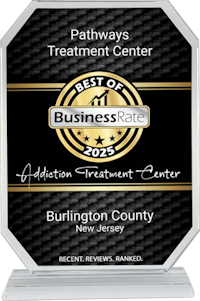Alcohol Rehab in Burlington, New Jersey
Alcohol addiction can impact every part of your life, but recovery is possible. Our outpatient alcohol treatment program in New Jersey combines medical support, counseling, and compassionate care to help you regain control.
Our drug and alcohol addiction center in Burlington, New Jersey can help you or a loved one suffering from alcoholism heal in a safe place. We provide a safe and supportive environment to help you meet your recovery goals.
Alcohol Rehab in New Jersey
Alcohol Rehab in Burlington, New Jersey
Alcohol addiction, also known as alcoholism, is a chronic disease that causes individuals to have a physical and emotional dependence on alcohol. This dependence is fueled by the brain’s reward system, which is triggered by the release of dopamine when alcohol is consumed. Over time, the brain becomes accustomed to these dopamine surges and craves more alcohol to achieve the same pleasurable effects.
While anyone can develop alcohol addiction, certain factors increase the risk. Genetic predisposition, exposure to alcohol at an early age, and a history of trauma or mental health disorders can make individuals more susceptible. Understanding these factors can help individuals and their loved ones recognize the signs of alcohol addiction, then seek professional addiction treatment.
One theory behind alcohol dependence is the imbalance of neurotransmitters in the brain. Alcohol affects the levels of several neurotransmitters, such as GABA and glutamate, which are responsible for regulating mood and behavior. When these neurotransmitters are disrupted, individuals may experience anxiety, depression, and cravings for alcohol.
Furthermore, research has shown that alcohol addiction can also have a profound impact on the structure and function of the brain. Prolonged alcohol use can lead to shrinkage in certain areas of the brain, such as the prefrontal cortex. This is the region responsible for decision-making and impulse control. This structural damage can contribute to the compulsive and impulsive behaviors often observed in individuals with alcohol addiction.
Recognizing the signs of alcohol addiction is crucial for getting help. Some common signs include:
- An inability to control the amount consumed
- Neglecting responsibilities due to alcohol use
- Experiencing withdrawal symptoms when attempting to quit
- Continuing to drink despite negative consequences on their personal relationships, health, and overall well-being
It is important to note that alcohol addiction can manifest differently in different individuals. Some may exhibit obvious signs of intoxication and impaired judgment, while others may appear functional on the surface but struggle with internal battles. Understanding the various manifestations of alcohol addiction can help loved ones intervene and provide support.
If you suspect that you or a loved one may have an alcohol addiction, it is essential to seek professional help from our rehab programs in New Jersey. Our addiction specialists can evaluate the situation and recommend the most appropriate treatment path. Remember, seeking rehab for alcohol addiction is the first step towards a healthier and happier life.

Alcohol Rehab in New Jersey
Seeking Rehab for Alcohol Addiction
Seeking rehab for alcohol addiction is a challenging but worthwhile endeavor. It requires acknowledging the problem and making the decision to seek help. Once this crucial step is taken, individuals have several treatment options.
Acknowledging that you have a problem with alcoholism is often the most difficult part of the recovery process. Denial and shame can prevent individuals from seeking help. Understanding that alcohol addiction is a disease, not a personal failing, is essential in taking that first step toward recovery.
Opening up to loved ones about your struggle with alcohol addiction can provide a support network that is crucial for success. Loved ones can offer encouragement, understanding, and accountability throughout the recovery journey.
Building a strong support system that includes friends, family, therapists, and support groups can significantly enhance the recovery process. These individuals can offer guidance, empathy, and a sense of community that fosters a sense of belonging and acceptance.
Once the decision to seek help is made, individuals must choose the right treatment path for their specific needs. Different types of rehab for alcohol addiction are available, each offering unique benefits and considerations.
Factors such as the severity of addiction, individual preferences, and available resources can influence the choice of treatment. From inpatient rehabilitation programs to outpatient counseling and support groups, there are diverse options to cater to varying needs and circumstances.
Alcohol Rehab in New Jersey
The Role of Detox in Rehab for Alcohol Addiction
Detoxification, or detox, is an essential first step in rehab for alcohol addiction. It involves clearing the body of alcohol and managing withdrawal symptoms in a safe and supervised environment.
During detox, the body goes through a process of eliminating toxins accumulated from alcohol consumption. This process can be challenging, both physically and mentally. Healthy detox is crucial, as it lays the foundation for the rest of rehab for alcohol addiction and allows individuals to focus on their recovery.
Detoxing from alcohol can be physically and emotionally challenging. Withdrawal symptoms, such as tremors, nausea, and hallucinations, can be severe and even life-threatening in some cases. Therefore, medication-assisted treatment (MAT) during detox is crucial to ensure the safety and well-being of individuals going through this process.
Medical professionals play a vital role in monitoring the progress of individuals during detox. They can assess the severity of withdrawal symptoms and adjust treatment plans accordingly. Additionally, medical supervision ensures that any underlying health issues are addressed promptly, reducing the risk of complications during the detox process.
Medical professionals can provide medications to manage withdrawal symptoms and offer support during this critical phase. They can also monitor vital signs and intervene if any complications arise.
Withdrawal symptoms can vary in intensity and duration depending on the severity of the addiction. Common symptoms may include anxiety, insomnia, irritability, and cravings for alcohol. Individuals with more severe addictions may experience more drastic symptoms such as delirium tremens (DTs), a debilitating disorder that can cause permanent damage if not promptly treated.
It is essential for individuals undergoing detox to have a support system in place to help them cope with withdrawal symptoms. Support groups, therapy sessions, and spending time in sober living can provide emotional support and guidance during this challenging time.
Alcohol Rehab in New Jersey
Therapy and Counseling in Rehab for Alcohol Addiction
Therapeutic interventions in addiction recovery aim to address the underlying issues contributing to alcohol addiction and provide individuals with the skills and tools to maintain long-term sobriety. Therapy and counseling play a vital role in rehab for alcohol addiction.
Individual therapy sessions offer a confidential and personalized space for individuals to explore their thoughts, feelings, and behaviors related to alcohol addiction. Therapists can help individuals uncover root causes, develop coping strategies, and set realistic goals for their recovery journey.
Modalities commonly used in individual therapy for alcohol addiction include cognitive-behavioral therapy (CBT), dialectical behavior therapy (DBT), and motivational interviewing (MI). These evidence-based approaches can help individuals gain insight, change negative thought patterns, and develop healthier coping mechanisms.
Group therapy provides individuals with an opportunity to connect with others facing similar challenges. It allows individuals to share their experiences, offer support, and learn from one another’s successes and setbacks.
In group therapy, individuals can develop a sense of community, reduce feelings of isolation, and build social skills essential for maintaining sobriety. Group therapy can be facilitated by a therapist or conducted in a self-help format, such as Alcoholics Anonymous (AA) or similar support groups.

Alcohol Rehab in New Jersey
Alcohol Rehab Programs in Burlington, New Jersey
At Pathways Treatment Center, we offer a variety of alcohol rehab programs to cater to the unique needs of each individual struggling with alcohol addiction. Our rehab for alcohol addiction in New Jersey is designed to provide comprehensive and personalized care, ensuring the best chances for long-term recovery.
We offer a Partial Hospitalization Program (PHP) in NJ for those who need more intensive treatment. PHP offers a higher level of care than traditional outpatient programs, providing clients with a structured schedule of therapy sessions and activities while allowing them to live at home or in sober living housing.
An IOP offers a similar level of care but with more flexibility in terms of scheduling, making it suitable for individuals with work or school commitments. Our intensive outpatient program (IOP) is ideal for clients who have completed a higher level of care but still require ongoing support and therapy. It allows individuals to attend therapy sessions while maintaining their daily responsibilities.
We also offer Medication-Assisted Treatment (MAT) for individuals struggling with severe alcohol addiction. MAT combines medication with therapy to help manage withdrawal symptoms and cravings, increasing the chances of successful recovery.
At our facility, we understand that many individuals struggling with alcohol addiction may also have underlying mental health issues. That’s why we offer dual diagnosis treatment in NJ, which addresses both addiction and co-occurring mental health disorders simultaneously.
Our sober living program is ideal for individuals who have completed a residential treatment program and are ready to transition back into regular life. This program provides a structured, supportive environment where clients can continue their recovery journey while learning essential life skills.

Alcohol Rehab in New Jersey
Find Healing at Our Alcohol Rehab in New Jersey
Pathways Treatment Center is a premier alcohol rehab facility located in Burlington, New Jersey that offers comprehensive and personalized treatment programs for individuals struggling with alcohol addiction. Our state-of-the-art facility provides a safe and comfortable environment for clients to begin their journey towards sobriety.
If you or a loved one is struggling with alcohol addiction, don’t wait any longer to get help. Contact us today to learn how we can help you find healing and recovery at our alcohol rehab in New Jersey.



